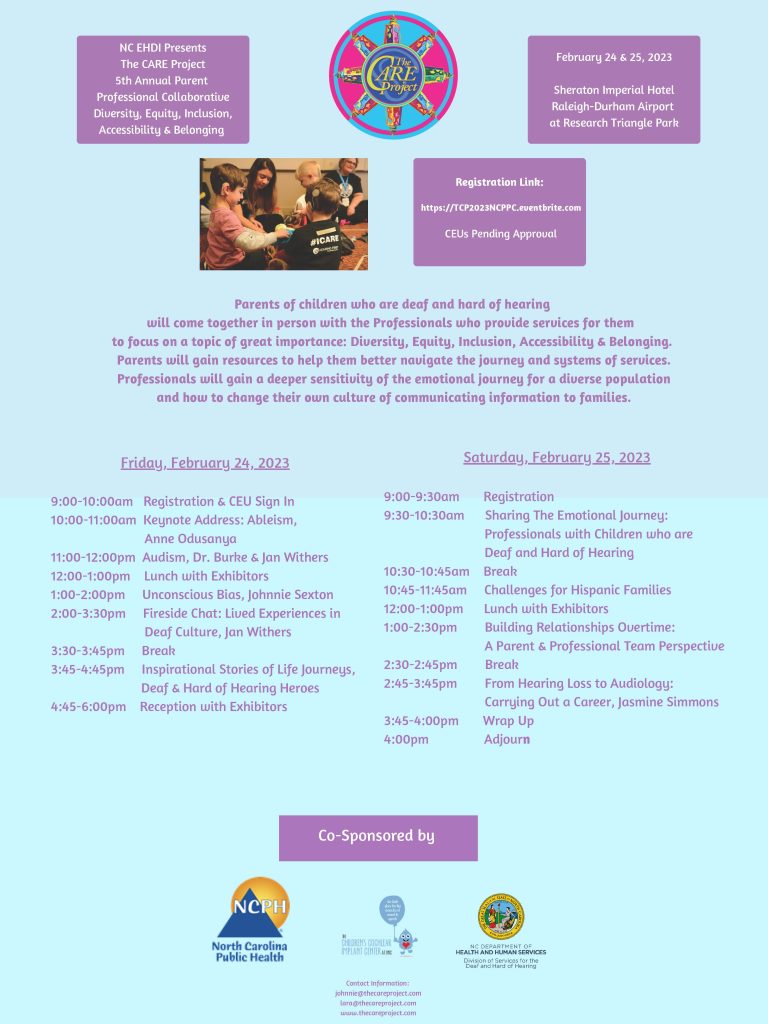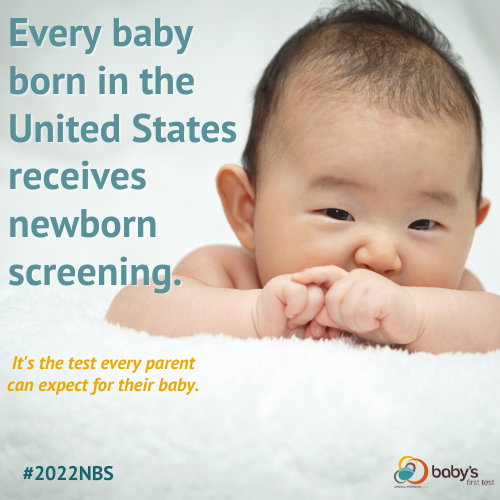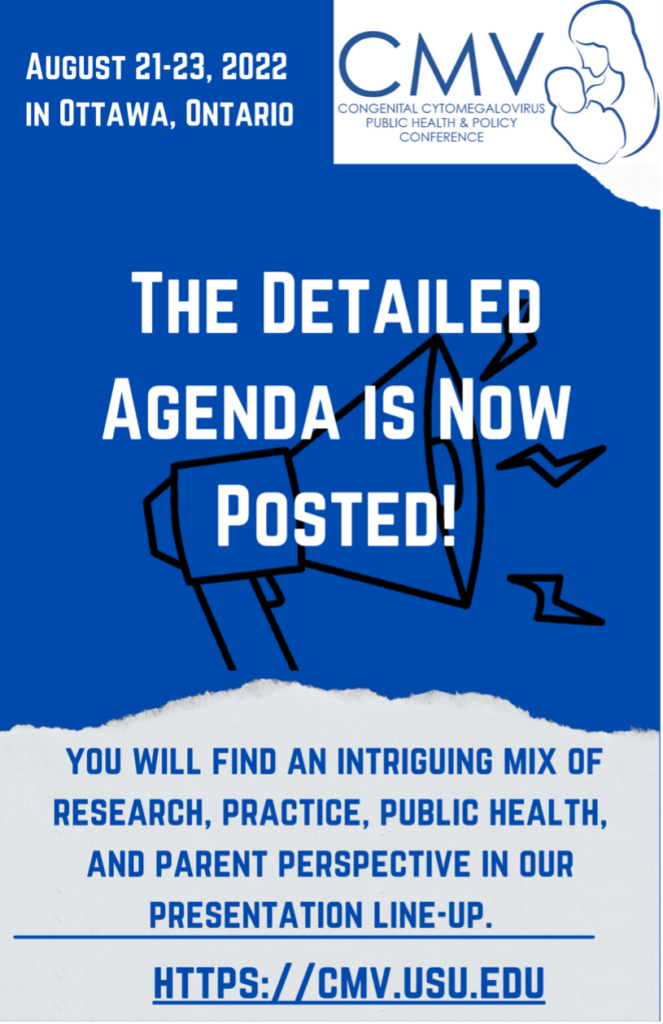The 2023 National EHDI Conference will be held in Cincinnati, OH March 5-7, 2023. Abstracts for presentations or posters that discuss one or more of the following topics related to improving EHDI programs are invited. To be considered, abstracts must be submitted by October 3, 2022. Notification of acceptance will be made on or around November 18, 2022. For more information or to submit an abstract, visit https://ehdimeeting.org/PresenterInfo.cfm
Abstracts for presentations or posters can be submitted in one of the following twelve program tracks.
1. EHDI Program Enhancement (e.g., efforts to improve any component of an EHDI program, screening efficiency or validity, systems change initiatives, protocol improvement, sustainability, extending EHDI to other populations).
2. Audiological Services (e.g., improving diagnostic protocols, fitting and management of hearing aids, cochlear implants, or FM systems, improving access to hearing technology, counseling families following audiological diagnosis, tele-audiology).
3. Language Acquisition and Development (e.g., helping early intervention specialists, parents, and others understand early language acquisition and development processes, the impact that achieving age-appropriate language outcomes has on the social/emotional well-being of children who are DHH; research on how to use language assessments; information for families and service providers about communication tools and strategies to evaluate and maximize language acquisition/development for children who are DHH).
4. Early Intervention (e.g., improving educational programs for 0-5 year-old children who are DHH including children who are Deaf+, coordination and communication among early intervention and EHDI programs, transition between programs, effective use of resources, providing culturally competent services, reaching underserved populations, effective use of tele-services).
5. Medical Home (e.g., providing family-centered health care within a community-based system, coordinating care between primary care providers, specialists, subspecialists, and other health care professionals, delivering health care that is accessible, continuous, comprehensive, compassionate, culturally effective and efficient for all involved, hearing screening during well-child care).
6. Follow-up, Tracking and Data Management (e.g., strategies for improving loss to follow-up, innovative tracking systems, using tracking information for quality improvement activities).
7. Family Perspectives, Engagement, and Support (e.g., how to make EHDI programs more family friendly, strategies for how parents can be effectively engaged and buildmeaningful stakeholder partnerships in EHDI systems, implementation of effective parent support programs, parent education, including parents in EHDI program leadership).
8. Program Evaluation and Quality Improvement (e.g., efforts to assess quality of services or data, quality improvement efforts, results of statewide program evaluations, reporting to funders and administrators, strategies for assuring effective use of EHDI advisory committees, examples of how “small tests of change” have led to system-wide improvements).
9. EHDI Workforce, Advocacy, and Legislative/Policy Issues (e.g., pre-service and in-service education for EHDI providers, workforce shortages and how to reduce them, strategies to address knowledge gaps, mandates for insurance coverage for hearing technology, securing funding for program improvement, public awareness activities, state legislative or advocacy efforts)
10. Involvement of Adults Who are DHH in EHDI Programs (e.g. how to engage adults who are Deaf or Hard of Hearing (DHH) in improving EHDI systems, strategies for how adults who are DHH can build meaningful stakeholder partnerships within EHDI systems, implementation of effective DHH Mentor/Adult Role Model/Guide programs, how to use adults who are DHH in supporting families)
11. Collaboration and Coordination with Other Screening Programs (e.g., why and how EHDI systems can collaborate with emergency preparedness, congenital cytomegalovirus (cCMV) screening, metabolic (blood spot) screening, critical congenital heart defect (CCHD) screening, late onset hearing loss (LOHL)/periodic childhood hearing screening). Includes presentations about how the COVID-19 pandemic has affected EHDI programs and how EHDI programs have responded and planned for response to future emergent issues.
12. Diversity, Equity and Inclusion (e.g. effective strategies to reduce and mitigate the effects of social determinates of health and health disparities, how to recognize and mitigate the effects of explicit and implicit bias; effective strategies to ensure that activities are inclusive of and address the needs of the populations it serves, including geography, race, ethnicity, disability, gender, sexual orientation, family structure, socio-economic status).
Abstracts that are considered to be a commercial product endorsement in the opinion of the EHDI Program Committee will not be accepted. All abstracts must be in English. Presenters must register for the EHDI Conference.
Abstract Review and Scoring
The Early Hearing Detection and Intervention (EHDI) Annual Conference strives to provide key stakeholders an opportunity to identify areas of concern, promote collaboration, and share best practices. EHDI Conference participants range from state and local programs to the federal level and from academicians to families.
The Conference goals are to enhance the implementation of comprehensive state-based EHDI programs and improve EHDI services. This includes current research and research methods related to EHDI, cultural competence of providers and assessment of their abilities to work with children who have hearing loss, their families and communities and enhancing and creating new and ongoing working relationships.
Abstract submissions will be reviewed and scored according to the following criteria by a committee appointed by the EHDI Conference Planning Committee.
1. Relevance and significance to the early identification of hearing loss and early intervention services for infants and young children with hearing loss and their families. [1 – 20 points]
o The abstract should address a current topic and information appropriate for the purposes of the Conference goals.
o The abstract should address important issues or gaps related to improving state-based EHDI services.
o The abstract should inform, enable, or update others in improving EHDI services regarding potential issues related to clinical practice, education of professionals/families, or future research.
o The abstract should have the potential to advance the practice/knowledge base of EHDI.
o The abstract should expand the discussion or perspective to build on existing knowledge or address new knowledge, discoveries, methodologies, tools, technologies, or practices.
2. Overall clarity [1 – 10 points]
o The abstract should be well written and organized in a coherent manner.
o The amount of information to be presented should be appropriate for the proposed session length and format.
o The abstract should clearly describe the presentation’s goals and learner outcomes.
o The abstract should provide prospective participants enough information to determine if the session will meet their needs.
o If research results are included, they should be clearly described and supported by statistical findings with the conclusions supported by the results.



